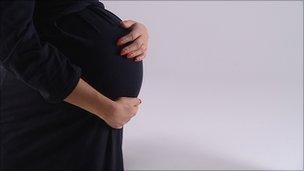Who, What, Why: Why do the rich get child benefit?
- Published

Child benefit is to be axed for higher-rate taxpayers, the chancellor has announced. Why did this payment go to rich and poor alike in the first place?
Announcing that child benefit will be axed for higher-rate taxpayers from 2013, Chancellor George Osborne said it was "very hard to justify taxing people on much lower incomes in order to pay the child benefit to some of the better-off in our society".
It is a powerful argument in an era when rich and poor alike are braced for painful spending cuts. But when the British welfare state was established in the aftermath of World War II, the principle of making it accessible to all was regarded as crucial.
According to Professor Stein Ringen of the University of Oxford, post-war policymakers were scarred by the indignities of the means test during the 1930s depression and believed making services and payments available to all would reinforce support for the system among rich and poor alike.
"The advantage of universal benefits is their simplicity - means testing was regarded as very complicated and inefficient," he adds.
"With universal benefits, you can be sure that those who need them most will get them."
The civil servant William Beveridge's 1942 blueprint for the welfare state envisaged a "cradle to the grave" system of shared citizenship.
On the basis of these principles, Clement Attlee's Labour government introduced the family allowance in 1946, paid to households for all but their first child.
This were superseded in 1975 by child benefit, which was set at a higher level than the family allowance, included all children and was paid directly to mothers and to lone fathers.
Pat Thane, professor of contemporary British history at the University of London's Institute of Historical Research, argues that the 1970s reforms reflected changes in assumptions about the status of women.
She says child benefit also replaced tax allowances, introduced in 1911, which "were granted to all income-tax payers in respect of each child". These "benefited mainly the better-off and mainly men".
"Women had campaigned to have them paid to women and not to men through the pay packet or the tax system because they didn't trust all men to hand the money to their families." she adds.
Over time, however, the assumptions which underpinned the policy were eroded, according to Bernard Harris, professor of the history of social policy at the University of Southampton.
In the immediate post-war era, he says, Labour politicians tended to favour universality, while the Conservatives leaned towards targeting.
He traces the move away from universalism to the Labour Party's abandonment during the 1990s of high rates of taxation for those on the highest incomes.
"Because they accepted that, the flipside was that you targeted benefits away from high earners," he says - hence Child Tax credits, introduced in 2003 to address need within the tax system, rather than straightforward handouts.
"Because this thinking hit the better-off, the parties' positions switched - so you had a situation where the Conservatives were calling for the restoration of the link between pensions and earnings and Gordon Brown was resisting it."
As such, Mr Osborne will be aware that - even if ending universal child benefits hurts many of his own party's supporters - the trend towards his move has been evident on both sides of the political aisle.